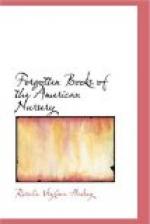“Once on a time two dogs went out to walk. Tray was a good dog, and would not hurt the least thing in the world, but Snap was cross, and would snarl and bite at all that came in his way. At last they came to a town. All the dogs came round them. Tray hurt none of them, but Snap would grin at one, snarl at the next, and bite a third, till at last they fell on him and tore him limb from limb, and as poor Tray was with him, he met with his death at the same time.
Moral
“By this fable
you see how dangerous it is to be in company with bad
boys. Tray was
a quiet harmless dog, and hurt nobody, but,
&c."[45-A]
Thus we find that Locke sowed the seed, Watts watered the soil in which the seed fell, and that Newbery, after mixing in ideas from his very fertile brain, soon reaped a golden harvest from the crop of readers, picture-books, and little histories which he, with the aid of certain well-known authors, produced.
According to his biographer, Mr. Charles Welsh, John Newbery was born in a quaint parish of England in seventeen hundred and thirteen. Although his father was only a small farmer, Newbury inherited his bookish tastes from an ancestor, Ralph or Rafe Newbery, who had been a great publisher of the sixteenth century. Showing no inclination toward the life of a farmer, the boy, at sixteen, had already entered the shop of a merchant in Reading. The name of this merchant is not known, but inference points to Mr. Carnan, printer, proprietor, and editor of one of the earliest provincial newspapers. In seventeen hundred and thirty-seven, at the death of Carnan, John Newbery, then about twenty-four years of age, found himself one of the proprietor’s heirs and an executor of the estate. Carnan left a widow, to whom, to quote her son, Newbery’s “love of books and acquirements as a printer rendered him very acceptable.” The amiable and well-to-do widow and Newbery were soon married, and their youngest son, Francis Newbery, eventually succeeded his father in the business of publishing.
[Illustration: Title-page from “A Little Pretty Pocket-Book"]
Shortly after Newbery’s marriage his ambition and enterprise resulted in the establishment of his family in London, where, in seventeen hundred and forty-four, he opened a warehouse at The Bible and Crown, near Devereux Court, without Temple Bar. Meanwhile he had associated himself with Benjamin Collins, a printer in Salisbury. Collins both planned and printed some of Newbery’s toy volumes, and his name likewise was well-known to shop-keepers in the colonies. Newbery soon found that his business warranted another move nearer to the centre of trade. He therefore combined two establishments into one at the now celebrated corner of St. Paul’s Churchyard, and at the same time decided to confine his attention exclusively to book publishing and medicine vending.




